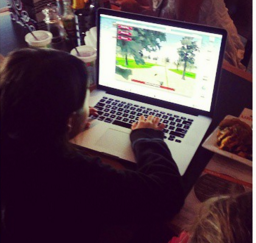I cannot emphasize enough the importance of algebra
As a professor, I saw SO many students enter college with high hopes, only to run into the obstacle of their first college level math course. One of two things happened. Either they dropped out of college altogether when they found out that they had to take two or three “developmental” courses before they could even reach the level of taking a required College Algebra course, or when they barely pass that class, they change their career goal. Students go from pre-med or pre-engineering majors to majors in communication, social work or Native American studies or elementary education, for example.
If your goal is to be a teacher or historian, great – but I see people GIVING up on their goals because they don’t believe they can pass the required courses.
They are only half-right. The truth is that many students enter college unable to pass the required courses at that moment because they don’t have the prerequisite knowledge. It doesn’t mean they can’t ever pass and become a physician or software developer or astronaut.
How are your personal beliefs applied to the work you do?
This was a question I was asked recently and it may seem odd in relation to algebra but bear with me. This is what I believe.
Success comes one small step at a time – and so does failure
Those students who were not prepared for College Algebra as freshmen were also not prepared for high school algebra (which if you go to an affluent, private school you actually take in grade eight).
That’s why I do what I do and where my beliefs come in. If you want your child to be ready for algebra, I hope you started monitoring their math in third or fourth grade.
Start here to see your child’s achievement in math
I’m not going to recommend you start administering standardized tests at home. You can sit with your child for 10 minutes a few days in a row and get a good estimate, with minimal whining.

You can play a math game with your child and see how well he or she does. All of these games also have the added bonus of teaching your child about Native American and Latin American history. Just play, spend time with your child and see where he or she succeeds and where your child struggles.
MULTIPLICATION & DIVISION – Should be mastered by the end of fourth grade
Making Camp Ojibwe – see how well your child does with multiplication. (It’s free, by the way.)
Making Camp Lakota – see how easily your child answers division problems (Also free)
Spirit Lake (this requires a download on a Mac or Windows computer) – is a more extensive game with multiplication and division problems
FRACTIONS – Should be mastered by the end of sixth grade (preferably fifth grade)
Fish Lake, available for Mac, Windows and iPad, starts with what is a fraction and progresses through multiplying fractions

Basic Statistics – Median, Variability – should be mastered by seventh grade
Forgotten Trail begins with fractions and introduces statistics – plays on the web
AzTech: The Story Begins – also begins with fractions and introduces statistics, plays on the web or iPad (this is free, too)
AzTech : Meet the Maya – continues with statistics, plays on an iPad
I’m doing my bit to make the world a little better. How about you?
Please, please whether you use our games or something else, do listen to me. Those kids who showed up at the university and had their dreams shattered when they were 18 or 19 years old didn’t fall behind in math all at once. It was gradually over time and often no one particularly noticed it until they didn’t make that cut for algebra at the end of seventh grade. Start monitoring your child’s math achievement – now, today.
